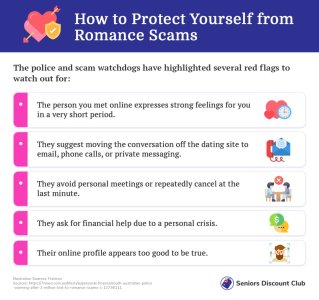Police issue urgent warning as Aussies lose millions to heart-wrenching romance scams!
In the age of digitalisation, finding love online can be a wonderful experience. However, it can also open doors to a world of deception and heartbreak.
Scamwatch, a website by the Australian Competition and Consumer Commission (ACCC), reported that Australians lost more than $40 million to romance scams in the previous year.
In May 2023, dating and romance scams had cost a staggering $3.2 million, with women accounting for 73 per cent of the misappropriated funds.
South Australians, in particular, have reportedly lost over $2 million to this scam this year, according to the South Australian Police.
As Scams Awareness Week wraps up, the police urge people to remain vigilant and aware of the potential dangers lurking behind the screen.
Romance scams, also known as catfishing in some cases, typically occur online through dating apps, websites, and social media platforms.
Cybercriminals create fake profiles, often impersonating military personnel, aid workers, or professionals working abroad, to lure unsuspecting victims into their traps.
Senior Constable Lauren Degabriele from the Cybercrime Unit explained the modus operandi of these scammers.
'Scammers will work on a victim for weeks, sometimes months,' she said. ‘These scams are also known as catfishing.’
The goal is to manipulate the victim into believing there's an emotional connection before revealing their true intention—to extract money.
The Impact of Romance Scams on Seniors
Scamwatch reported that people aged 65 and older suffered the highest total losses to romance scams last year, totalling over $12.9 million.
This alarming statistic underscores the vulnerability of seniors to such scams, often due to their lack of familiarity with online platforms and their trusting nature.
Last September, the Queensland Police exposed an alleged romance scam that has reportedly cost lonely single men nearly $500,000 in total. The operation led to the raid of the homes of a Gold Coast mother and daughter duo, where cash, documents resembling a ledger, and mobile phones were found. You can read more about this story here.
In the same month, a Sydney woman lost $157,000 to a dating scam called 'pig butchering'. She was convinced by the scammer to trade cryptocurrency on fake sites, resulting in the loss of her life savings. You can learn more about this tactic here.
‘Scammers typically create fake online profiles designed to lure people in,’ Degabriele added.
If you suspect you've been a victim of a romance scam, it's crucial to act immediately. Contact your bank to stop any payments and report the incident to the police.
You can also report a scam at https://www.scamwatch.gov.au/report-a-scam.
If you or someone you know is struggling with the emotional aftermath of a scam, don't hesitate to seek help.
Reach out to Lifeline at 13 11 14 or beyondblue at 1300224636. You can also talk to your GP, a local health professional, or someone you trust.
In the digital age, it's essential to stay informed and vigilant. Remember, if something seems too good to be true, it probably is. Let's work together to create a safer online community for all Australians.

Have you or someone you know been victims of a romance scam, members? Share your experiences and tips for staying safe online in the comments below.
Scamwatch, a website by the Australian Competition and Consumer Commission (ACCC), reported that Australians lost more than $40 million to romance scams in the previous year.
In May 2023, dating and romance scams had cost a staggering $3.2 million, with women accounting for 73 per cent of the misappropriated funds.
South Australians, in particular, have reportedly lost over $2 million to this scam this year, according to the South Australian Police.
As Scams Awareness Week wraps up, the police urge people to remain vigilant and aware of the potential dangers lurking behind the screen.
Romance scams, also known as catfishing in some cases, typically occur online through dating apps, websites, and social media platforms.
Cybercriminals create fake profiles, often impersonating military personnel, aid workers, or professionals working abroad, to lure unsuspecting victims into their traps.
Senior Constable Lauren Degabriele from the Cybercrime Unit explained the modus operandi of these scammers.
'Scammers will work on a victim for weeks, sometimes months,' she said. ‘These scams are also known as catfishing.’
The goal is to manipulate the victim into believing there's an emotional connection before revealing their true intention—to extract money.
The Impact of Romance Scams on Seniors
Scamwatch reported that people aged 65 and older suffered the highest total losses to romance scams last year, totalling over $12.9 million.
This alarming statistic underscores the vulnerability of seniors to such scams, often due to their lack of familiarity with online platforms and their trusting nature.
Last September, the Queensland Police exposed an alleged romance scam that has reportedly cost lonely single men nearly $500,000 in total. The operation led to the raid of the homes of a Gold Coast mother and daughter duo, where cash, documents resembling a ledger, and mobile phones were found. You can read more about this story here.
In the same month, a Sydney woman lost $157,000 to a dating scam called 'pig butchering'. She was convinced by the scammer to trade cryptocurrency on fake sites, resulting in the loss of her life savings. You can learn more about this tactic here.
‘Scammers typically create fake online profiles designed to lure people in,’ Degabriele added.
If you suspect you've been a victim of a romance scam, it's crucial to act immediately. Contact your bank to stop any payments and report the incident to the police.
You can also report a scam at https://www.scamwatch.gov.au/report-a-scam.
If you or someone you know is struggling with the emotional aftermath of a scam, don't hesitate to seek help.
Reach out to Lifeline at 13 11 14 or beyondblue at 1300224636. You can also talk to your GP, a local health professional, or someone you trust.
In the digital age, it's essential to stay informed and vigilant. Remember, if something seems too good to be true, it probably is. Let's work together to create a safer online community for all Australians.
Key Takeaways
- Scamwatch reported Australians lost over $40 million to catfishing and romance scams last year. In May 2023, romance scams had cost a staggering $3.2 million, with women accounting for 73 per cent of the misappropriated funds.
- South Australians have reportedly lost more than $2 million to romance scams.
- The scams often occur through dating apps, websites, and social media, with scammers creating fake profiles to manipulate victims emotionally before asking for money.
- Authorities urge individuals who suspect they may be victims of such scams to contact their bank and the police and to watch out for red flags such as unfamiliar message requests or sketchy online profiles.
Have you or someone you know been victims of a romance scam, members? Share your experiences and tips for staying safe online in the comments below.
Last edited:









